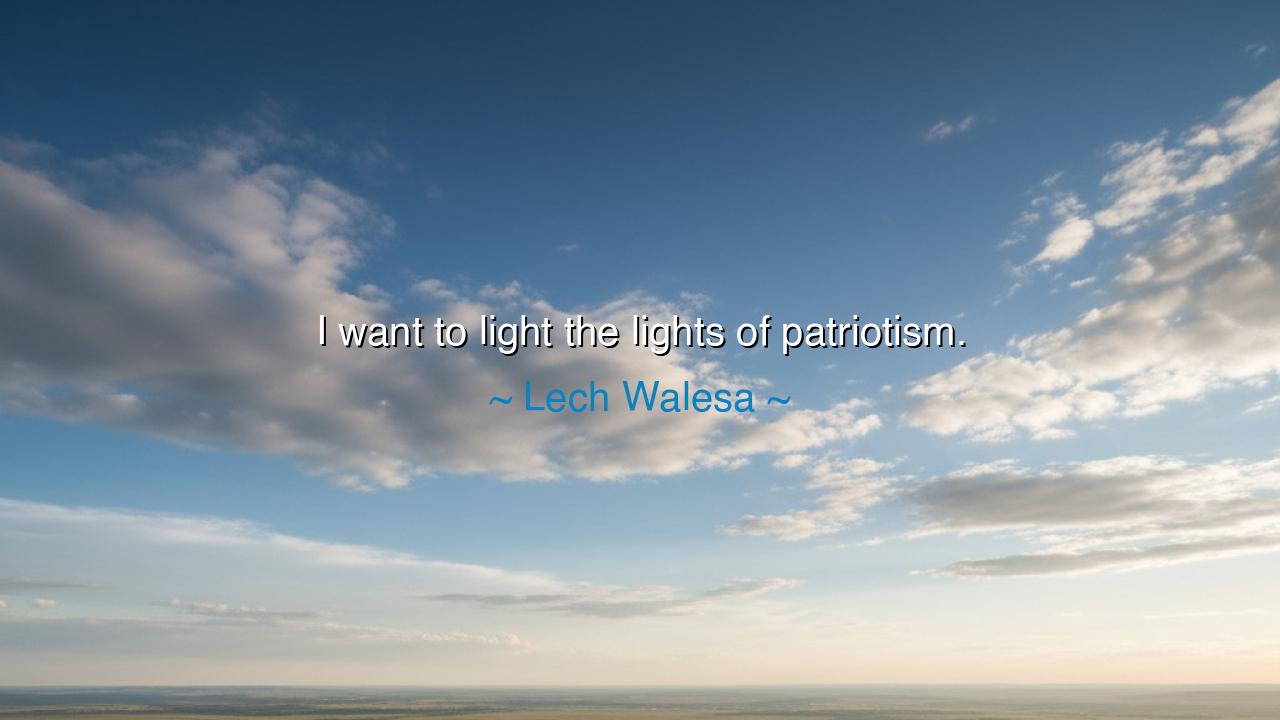
I want to light the lights of patriotism.






The words of Lech Walesa—“I want to light the lights of patriotism.”—shine like a torch lifted high in the darkness. They come not from a man of idle speech, but from a worker, an electrician, who rose from the shipyards of Gdańsk to challenge the might of an empire. When Walesa spoke of lighting the lights of patriotism, he spoke of awakening a nation that had long been oppressed, reminding his people that love of country was not submission to rulers, but the courage to reclaim freedom. His words are the cry of one who knows that even in the darkest night, a single flame can spread to ignite a thousand hearts.
At the heart of his declaration is the understanding that patriotism is a fire of the spirit, not a command of the state. Under communist rule, Poland’s people were taught a patriotism of slogans and obedience, where loyalty meant silence. Walesa rejected this falsehood. To him, to be a patriot was not to repeat the words of the powerful, but to stand for truth, faith, and the dignity of the Polish people. When he said he wished to light those lights, he meant to awaken his countrymen from despair, to rekindle their belief that they themselves were guardians of their nation’s soul.
History remembers the struggle of the Solidarity movement, born in the shipyards in 1980. Walesa, a man with calloused hands and a steadfast heart, stood before workers and spoke of unity, freedom, and hope. Against tanks, soldiers, and the machinery of oppression, he lit a flame that spread across Poland and eventually across Eastern Europe. The tyrants wielded weapons, but Walesa wielded light—the light of patriotism rooted in justice and faith. And in the end, it was the light that overcame the darkness.
This vision of patriotism is echoed across ages. Consider the American Revolution, when Thomas Paine wrote The American Crisis: “These are the times that try men’s souls.” His words, like Walesa’s, were sparks meant to kindle courage. Both men understood that nations are sustained not only by arms, but by the spirit of their people. It is the unseen fire of conviction, once lit, that drives ordinary men and women to do extraordinary things for the sake of freedom.
The ancients, too, would have understood Walesa’s imagery. The Greeks spoke of the sacred fire kept burning in the hearth of the polis, symbol of the city’s life and unity. If the flame went out, the city was thought to be in peril. Walesa’s desire to light the lights of patriotism carries the same meaning: to keep alive the flame of a people’s courage, their memory, and their dignity, even when foreign rulers sought to extinguish it.
The lesson for us is clear: patriotism is not passive—it must be lit, kindled, and tended like a flame. It is not enough to inherit a love of country; we must actively cultivate it by standing for justice, protecting freedom, and remembering the sacrifices of those who came before. When corruption spreads or despair takes root, it is the duty of every citizen to light again the lamps of hope, courage, and devotion.
In daily life, this means finding ways to serve: to uplift one’s community, to defend truth in the face of lies, to protect the weak, and to live with integrity. It means teaching the young not a shallow patriotism of slogans, but a deep and enduring love of justice, freedom, and sacrifice. Each of us holds a match that can light another’s flame; together, we can fill a nation with brightness that no darkness can overcome.
Thus let Walesa’s words echo like a vow: “I want to light the lights of patriotism.” May we, too, take up that torch—not as conquerors, but as servants of truth and freedom. For the world is filled with shadows, but the flame of true patriotism, once lit, spreads without end, illuminating the path of generations yet to come.






AAdministratorAdministrator
Welcome, honored guests. Please leave a comment, we will respond soon